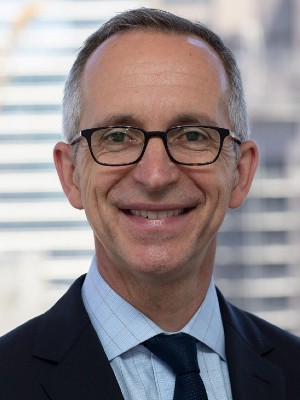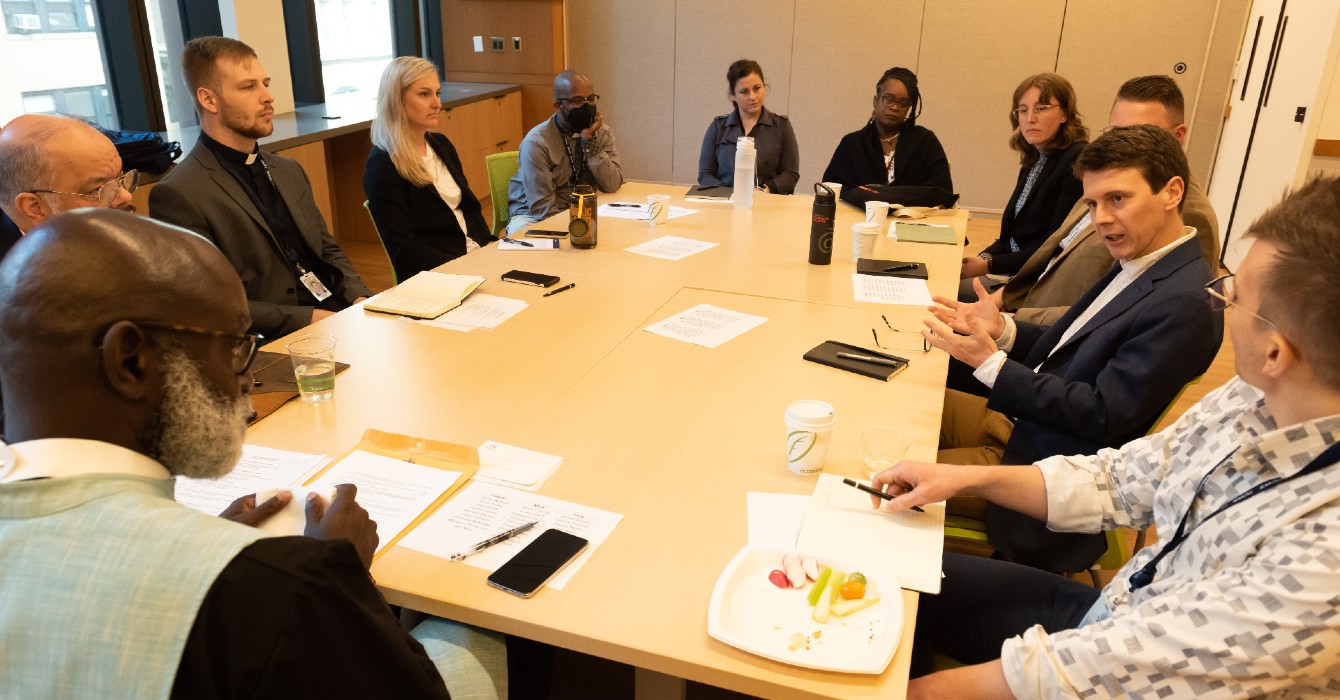After years of development, the first cohort of Leadership Fellows at Trinity Church Wall Street arrived in 2022.
Over the course of development, Rob Garris, the managing director of leadership development at Trinity, conducted listening sessions with clergy, denominational leaders and current seminarians to identify what the leadership program should strive to teach its fellows.

A common refrain was that young leaders will need to navigate making the church and its communities less hierarchical and more dynamic, so Garris and his colleagues set about designing a program to nurture those ways of leadership.
Now, they try to model that adaptability in how they lead the program as well.
“We’ve said this to each other every step of the way as we were designing and launching and now running the first year: ‘Changing the program after the first year is not a failure,’” Garris said. “Changing the program is actually success.”
The Trinity Leadership Fellows Program is now in its second year, with another class of 24 fellows.
Garris spoke with Faith & Leadership’s Chris Karnadi about the program and lessons others might glean to start their own leadership development programs.
Faith & Leadership: What is the Trinity Leadership Fellows Program?
Rob Garris: The program is a combination of a community-building experience that brings together promising faith leaders from across multiple denominations and faiths to develop deep relationships with each other so they can support each other in their leadership journeys over a very long period of time.
The community-building element was always a central part of the concept, but it’s also a skill-building project to provide people of faith with practical skills to make them more effective in carrying out projects and in reaching their goals in ways that are grounded in their faith.
F&L: How did the program come about?
RG: The first class arrived in September of 2022, but it was in concept and design for many years before that was slowed by the pandemic.
The idea emerged specifically from the recognition that Episcopal clergy were often given fairly complex leadership and managerial responsibility immediately in their very first call — they had to manage volunteers, to navigate conflicts in a congregation, to manage a vestry, financial resources, and real estate resources, to set strategy — but that the education they were receiving in seminary wasn’t really focused on those sorts of skills.
It was understandably delivering high-level education in the classic fields of theological education, biblical studies, theological studies, pastoral care. But those more practical managerial and leadership skills were in many instances just completely overlooked or lightly touched on.
We first started thinking of a program to train managerial skills for Episcopal clergy. But as we started talking to people about what’s going on in the church and the future of the church, it became clear that laypeople are already playing a much larger role in many congregations than was the norm in the past, and it’s likely to only grow in the future.
So then we started thinking of this as a project that was more about providing people of faith with the skills that they need to be effective and carry out their mission in the world. Sometimes that would mean clergy and a congregation, but many other times it would mean laypeople playing a wide variety of roles.
The design of the program expanded out to a broader set of personal development skills, to understand who these people are as leaders and where they need to build up personal strengths as leaders, and then some very nuts-and-bolts practical things about managing finances and real estate and change management processes. I think it’s a nice blend of personal growth and practical skills.
F&L: What are some of the ways that you accomplish those educational goals?
RG: First, it’s through a set of courses. All of the fellows together, whether in person or sometimes online, do a series of courses, each of them lasting eight weeks. The courses take them a little bit deeper in some of the skills that we think are important.
Part of our planning process for this program was to talk to a lot of clergy, lay leaders, bishops and canons in the Episcopal Church about what mindsets and skill sets were necessary for effective leadership in the future. And that’s how we came up with this list of classes that are offered over the span of 12 months.
But then the fellows also have the relationship building among the cohort, which is a really important part of the process and a really important asset for them going forward.
F&L: Is there a particular age range for the fellows?
RG: We’re deliberate about wanting a mix of ages in the class, and there has been some debate about that. It’s obviously easier to do a program that’s focused on, say, people who just finished seminary or people who have been out working or in ministry for 10 years. But we decided to blend it, because we felt like there’s important cross-learning that can happen there, as well as intergenerational learning or learning for different levels of experience.
We also blended it in that there are ordained and nonordained leaders. We blended it across faith. We’ve blended it across nationality. So we think that bringing all those different perspectives together is an important part of the learning experience.
But I would say that most of the fellows fall within a range of just having finished seminary or some other form of graduate education and maybe five to seven years out. But we haven’t put an upper limit on that. What we’re really interested in is what people feel they can offer to the group and what they feel they need from the group.
It’s a handcrafted cohort of 24 people, and we try to make sure that there’s a good mix of perspectives that are going to be in the classroom.
F&L: What have you learned from the first year of the program? Have there been any difficult but instructive moments?
RG: One of the reasons we delayed the launch of the program was because of the pandemic and our commitment to wanting to bring people together face to face to start the relationship building before we’re asking them to then do really difficult work online.
We designed a workshop of deep introspection for the first week asking the fellows to both examine and share with the other fellows how their faith, their value system, the joy that they bring into leadership roles, the difficulty and pain that they bring into leadership roles shapes who they are as a leader and how they go about leading.
We asked people to be very open and honest with that, to dig deep and to develop the skill at sharing in ways that maybe weren’t natural to them in the past.
There was pain in the room in some of those conversations, but it was beneficial and generative — but maybe too soon. We are going to manage that in ways that are a little more careful about the sequencing, so that it builds up into that vulnerability.
We also learned that it was important to recognize when there is a moment that you need to just give people time to pray together.
The fellows immediately taught us that prayer isn’t just something that has to happen at the beginning of the day and the end of the day and you’re done, but sometimes, just given where people are emotionally, you need to put the schedule aside and let a group just sit and pray. So we’re trying to be less attached to a schedule and more ready to let the Spirit move and to allow prayer and worship to be a natural, integral part of it.
F&L: What are some of the ways you and the program see leadership shifting in the future?
RG: We’ve heard a lot from people that future leaders will have a much less hierarchical way of thinking about leadership and community.
It’s no surprise to anyone, but the Episcopal Church is a fairly hierarchical institution, and most folks — I’m not offering a clever insight here — are saying the church needs to find its way out of some of the traditions of hierarchy if it’s going to be innovative and entrepreneurial and dynamic.
The church and its leaders have got to be much more grassroots and grounded in local communities, and younger leaders have very different instincts on how you go about engaging groups and connecting and understanding and listening and decision making.
There’s also a lot that all of the mainline denominations need to learn about how to create community in online and digital spaces, and younger generations have a very different approach to that.
People my generation and older see online spaces as a place to reproduce what’s happening in person, instead of just thinking anew from the ground up in the online space. How do we create something that’s natural and belongs online rather than trying to reproduce something that happens in a brick-and-mortar environment?
F&L: For people who might be thinking about creating some sort of program for young people, what would your advice be?
RG: Co-design it with the people you think are going to participate. Don’t build it in a vacuum.
We designed this program listening to more-senior folks in the church, but we also listened to folks at all levels about what was needed.
I would say this is true of any program that anyone is designing, whether for young people or anyone else, but co-design it with the people who you think are going to participate, and be sure that you really listen. And then once it’s built and running, continue listening and be ready to adapt.













